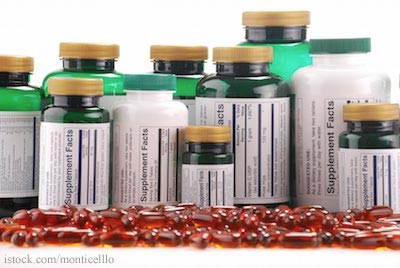Do you know what’s in that dietary or sports supplement you’re taking? Is that energy drink you bought at the checkout counter safe? Maybe not.
 Energy drinks and supplements, including those marketed as diet or sports aids, fall into the “food” category of products regulated by the U.S. Food and Drug Administration (FDA). Food producers aren’t required to provide the FDA with evidence of a product’s safety before selling it. And while food labels are supposed to accurately reflect ingredients and make no false claims about health benefits, some supplement makers skirt these rules causing dire health problems for the unsuspecting consumers who take them.
Energy drinks and supplements, including those marketed as diet or sports aids, fall into the “food” category of products regulated by the U.S. Food and Drug Administration (FDA). Food producers aren’t required to provide the FDA with evidence of a product’s safety before selling it. And while food labels are supposed to accurately reflect ingredients and make no false claims about health benefits, some supplement makers skirt these rules causing dire health problems for the unsuspecting consumers who take them.
Dietary supplements have been linked to cases of liver damage and death. In fact, a recent study by the Drug-Induced Liver Injury Network found that dietary supplements account for nearly 20 percent of drug-related liver injuries treated at hospitals. Energy drinks, such as 5-Hour Energy and Monster, have triggered reports to the FDA of adverse health events including heart attacks, miscarriages and death.
“Dietary Supplements ought to be regulated as drugs,” said Food Poisoning Bulletin Publisher Fred Pritzker, a food safety attorney who represents clients with liver damage from the dietary supplement OxyLite Pro. “Making that change would provide consumers with the assurance, rather than the assumption, that these products are safe and manufactured according to strict standards. Right now, dandruff shampoos get more scrutiny than dietary supplements.”
As Pritzker points out, dandruff shampoos are among the products the FDA regulates as drugs. Also included in that category: fluoride toothpastes, antiperspirants and sunscreens.
Before a new drug can enter the marketplace, the drug maker must test it on animals and submit an applictaion to the FDA that details the test results, the ingredients and the manufacturing process. Then it must complete three stages of testing on people, have the product label reviewed, have its application reviewed and have its manufacturing facility inspected. If it successfully makes it that far, it is reviewed by a panel that decides if the drug should be approved for sale. If approved, the drug enters a period of “post-market” monitoring where the drug maker submits regular safety reports to the agency.
That’s hardly the case for wild west world of supplements, a $30 billion market where makers can, and too often do, put harmful ingredients in products they market as healthful. At the turn of the last century, salesmen peddled curealls, remedies and tonics that made false claims about their healthful benefits. Often those tonics contained dangerous ingredients including narcotics such as opium, morphine, heroin, and cocaine or chemicals such as borax, turpentine and formaldehyde. A hundred years later, the story is pretty similar.
In December 2013, a report of liver damage in a previously healthy 28-year-old male, prompted the FDA to issue a December 23 consumer waning about Mass Destruction. A dietary supplement marketed as a muscle growth product, Mass Destruction was found to contain at least one unlisted synthetic anabolic steroid, a substance known to cause liver damage. The FDA warned consumers to immediately stop using the product. Mass Destruction, a product of Blunt Force Nutrition in Sims, N.C., was sold in retail stores, fitness centers, gyms, and on the Internet.
In November 2013, OxyLite Pro supplements were recalled after several reports of liver damage. In some cases the damage was so severe transplants were necessary. One person died. These products, manufactured by USPlabs LLC, Dallas, TX, contained an unapproved product and some were contaminated with Hepatitis. They were distributed nationwide through retail stores, mail orders and direct delivery.
Months before that recall, the FDA ordered a different formulation of OxyElite Pro to be destroyed. That batch contained a banned stimulant, DMAA, or dimethylamylamine, which can cause high blood pressure, heart attacks, seizures, psychiatric disorders and death.
Also last fall, a study published in the journal Drug Testing and Analysis revealed that pharmaceuticals and banned substances have been detected in hundreds of “natural” dietary supplements. One of them, Craze, a popular body-building supplement manufactured by Driven Sports, contained a meth-like stimulant, N,alpha-diethylphenylethylamine (N,alpha-DEPEA), that had never been studied in humans. The drug was not listed as an ingredient.
A quick scan of recent supplement stories published in Food Poisoning Bulletin shows several more recalls. In November, Vega One nutritional supplements were recalled because they contained an antibiotic. In October, Slim Fortune, Lidiy, and Slim Expert were recalled because they contain undeclared sibutramine, a previously controlled substance that was removed from the marketplace in 2010. In August, Quick Thin and Bethel Advance, by Bethel Nutritional Consulting, were recalled because they contained sibutramine and phenolphthalein. Sibutramine was pulled from the market because it caused serious risk of heart attack and stroke. And phenolphthalein has been shown to cause gastrointestinal problems, irregular heartbeat, muscle cramps, and cancer with long term use.
There are similar stories about energy drinks. 5-Hour Energy, byLiving Essentials LLC, is being investigated by the FDA and named in 33 lawsuits filed by attorneys general looking into the company’s marketing claims. The FDA says it has received reports of serious illness and death associated with this product.
The FDA has said it also received reports of illness and death associated with Monster Energy drink. In addition to causing serious illness, drinks with high caffeine content can cause vomiting, abdominal pain, tremors, and abnormal heart rates. Children and teenagers are especially at risk. A Maryland family filed a lawsuit against Monster after their 14-year-old daughter died after drinking the product.




